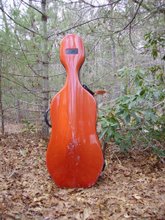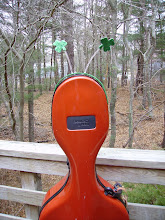My teacher suggested, as a memory builder, that I try saying the names of the notes in a particular passage, away from the instrument, away from the music. I used to be able to do this quite easily. In more than one lesson, I claimed I could write out the piece; I knew it that well. But in the actual playing of the piece, sometimes my mind went blank, as if those neurons weren't connecting properly.
I can't say this about current pieces. I don't think I could actually write them down. I am relying too much on automatic memory.
We went over one section in the lesson, me trying to remember the note names. I did play this section much more fluently, from memory, today (using the loaner bow only).
So, I am going to work on analytic memory, and have found some memory tips online.
These tips are from Music Master.com
1. Read and sing your music (without the instrument)
2. Color-code parts that are the same with markers
3. Practice away from the instrument and study the music by itself
4. Practice it in sections. Don't try to do it all at once
5. Practice one phrase/section 5 times in a row and then try to play it without the music
6. Do some of the sections spell a word? ie: b-a-g-g-a-g-e
7. Can you make a section/phrase spell something to help you remember? ie: Bears Always Eat Fish Every Friday
8. Finger practice without playing your instrument
9. Take it slow!
10. Reinforce 100% accuracy...don't allow yourself to make mistakes; your brain will remember them!
11. Slow practice too!
12. Use your metronome
13. Play for family and friends the weeks and days before a recital or performance
14. Play on other pianos (if you are a piano student) to get used to playing on pianos other than yours
15. Don't overpractice
16. Play with and without the music
17. Make a copy of your music and cut it up into sections. Number or letter the sections and have someone call out the section and you have to start the piece from that section
18. Tape record yourself and play it back to give and get feedback (
19. Don't forget to breath!
20. Stay relaxed (easier said than done!)
21. Don't Panic
22. Play for others
23. Have fun
I saw an article in today's paper about memory in mice likely to develop Alzheimer's disease. When given an enriched environment (cages filled with toys and exercise wheels) memory is restored. I have spent the last week enriching my environment by cleaning my almost hopelessly cluttered office, unearthing many long-forgotten toys (art supplies, CDs, etc.). And of course the cello is a fine amusement. All I need now is an exercise wheel, or to go to the exercise place more often.
Tuesday, May 1, 2007
Subscribe to:
Post Comments (Atom)












2 comments:
These are great tips. I think I'll print them all out. I've read that there are several different types of memory ... aural, visual, kinesthetic, etc., and that most people rely heavily on one or the other. I'm still trying to figure out what's best.
I agree about the different types of memory, and I think that is my current problem: relying on one type of memory that is no longer as effective as it once was, needing to branch out and try different techniques. I find it different for different instruments too. For instance, in fiddling (with violin, always in first position), I think of the notes as positions on a grid. I have lately decided that the better way would be to know the tune and know where the sounds are on the fingerboard, rather than memorizing mechanically. Hard to explain in a short note!
Post a Comment